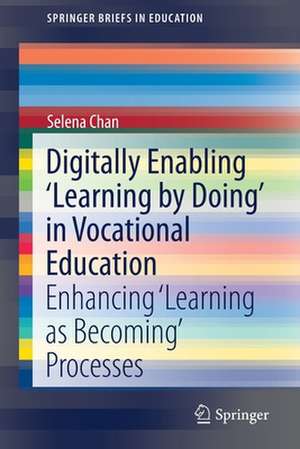Digitally Enabling 'Learning by Doing' in Vocational Education: Enhancing ‘Learning as Becoming’ Processes: SpringerBriefs in Education
Autor Selena Chanen Limba Engleză Paperback – iul 2021
Din seria SpringerBriefs in Education
-
 Preț: 317.28 lei
Preț: 317.28 lei -
 Preț: 478.71 lei
Preț: 478.71 lei - 20%
 Preț: 387.44 lei
Preț: 387.44 lei - 17%
 Preț: 392.10 lei
Preț: 392.10 lei -
 Preț: 196.30 lei
Preț: 196.30 lei -
 Preț: 394.41 lei
Preț: 394.41 lei -
 Preț: 356.32 lei
Preț: 356.32 lei -
 Preț: 444.52 lei
Preț: 444.52 lei -
 Preț: 196.15 lei
Preț: 196.15 lei -
 Preț: 262.86 lei
Preț: 262.86 lei -
 Preț: 370.61 lei
Preț: 370.61 lei -
 Preț: 376.59 lei
Preț: 376.59 lei -
 Preț: 379.68 lei
Preț: 379.68 lei -
 Preț: 408.44 lei
Preț: 408.44 lei -
 Preț: 376.22 lei
Preț: 376.22 lei -
 Preț: 378.34 lei
Preț: 378.34 lei -
 Preț: 346.59 lei
Preț: 346.59 lei -
 Preț: 377.18 lei
Preț: 377.18 lei -
 Preț: 377.35 lei
Preț: 377.35 lei -
 Preț: 476.03 lei
Preț: 476.03 lei -
 Preț: 376.43 lei
Preț: 376.43 lei -
 Preț: 379.48 lei
Preț: 379.48 lei -
 Preț: 479.29 lei
Preț: 479.29 lei -
 Preț: 340.61 lei
Preț: 340.61 lei -
 Preț: 377.18 lei
Preț: 377.18 lei -
 Preț: 377.57 lei
Preț: 377.57 lei -
 Preț: 376.59 lei
Preț: 376.59 lei -
 Preț: 377.18 lei
Preț: 377.18 lei -
 Preț: 380.84 lei
Preț: 380.84 lei -
 Preț: 379.09 lei
Preț: 379.09 lei -
 Preț: 354.10 lei
Preț: 354.10 lei -
 Preț: 377.95 lei
Preț: 377.95 lei -
 Preț: 379.68 lei
Preț: 379.68 lei -
 Preț: 377.35 lei
Preț: 377.35 lei -
 Preț: 346.59 lei
Preț: 346.59 lei -
 Preț: 444.52 lei
Preț: 444.52 lei -
 Preț: 376.22 lei
Preț: 376.22 lei -
 Preț: 381.21 lei
Preț: 381.21 lei -
 Preț: 348.13 lei
Preț: 348.13 lei -
 Preț: 409.25 lei
Preț: 409.25 lei -
 Preț: 410.17 lei
Preț: 410.17 lei -
 Preț: 377.57 lei
Preț: 377.57 lei -
 Preț: 380.63 lei
Preț: 380.63 lei -
 Preț: 376.59 lei
Preț: 376.59 lei -
 Preț: 377.57 lei
Preț: 377.57 lei -
 Preț: 380.07 lei
Preț: 380.07 lei -
 Preț: 378.54 lei
Preț: 378.54 lei -
 Preț: 379.48 lei
Preț: 379.48 lei -
 Preț: 377.73 lei
Preț: 377.73 lei -
 Preț: 342.74 lei
Preț: 342.74 lei
Preț: 478.15 lei
Nou
Puncte Express: 717
Preț estimativ în valută:
91.50€ • 99.36$ • 76.86£
91.50€ • 99.36$ • 76.86£
Carte tipărită la comandă
Livrare economică 22 aprilie-06 mai
Preluare comenzi: 021 569.72.76
Specificații
ISBN-13: 9789811634048
ISBN-10: 9811634041
Pagini: 113
Ilustrații: XII, 113 p. 8 illus., 7 illus. in color.
Dimensiuni: 155 x 235 mm
Greutate: 0.19 kg
Ediția:1st ed. 2021
Editura: Springer Nature Singapore
Colecția Springer
Seria SpringerBriefs in Education
Locul publicării:Singapore, Singapore
ISBN-10: 9811634041
Pagini: 113
Ilustrații: XII, 113 p. 8 illus., 7 illus. in color.
Dimensiuni: 155 x 235 mm
Greutate: 0.19 kg
Ediția:1st ed. 2021
Editura: Springer Nature Singapore
Colecția Springer
Seria SpringerBriefs in Education
Locul publicării:Singapore, Singapore
Cuprins
1 Introduction.- 2 Learning as becoming and role of technology-enhanced learning (TEL) to support the process.- 3 TEL in VET to the present.- 4 The future of work and how it impinges on ‘learning as becoming’, TEL and VET pedagogy.- 5 VET 4.0 learning approaches for industry 4.0.- 6 TEL supporting VET 4.0.- 7 Implementing TEL in VET 4.0.
Notă biografică
Dr Selena Chan is an educational developer at Ara Institute of Canterbury Ltd.(formerly Christchurch Polytechnic Institute of Technology – CPIT). Selena began her working life as a pastry cook, and taught baking for 25 years before shifting into a staff development role. As an educational developer, she undertakes curriculum and learning design and the implementation of technology-enhanced learning projects across a range of vocational education discipline areas. Selena has led a range of vocational educational pedagogical based studies to improve the learning for trades students and vocational learners. Many of these projects were funded by Ako Aotearoa, the New Zealand Centre for Tertiary Teaching Excellence, and these studies often included the building of research capability with vocational educators. Projects include studies of the perspectives of trade practitioners who become trade teachers, the perspectives of apprentices on how they go about learning a trade, the importance and support of peer learning in vocational learning, the design, development and implementation of a range of technology towards enhancing vocational learning including mobile phones, tablets and social networking platforms, and the role of e-assessments for learning to support learners towards completing New Zealand graduate profile based qualifications. Selena has also published extensively in vocational education journals and is on the editorial board of the Journal of Vocational Education and Training and co-editor for the International Journal of Training Research.
Caracteristici
Presents principles and approaches based on recent studies of apprenticeship, trades learning and technology-enhanced vocational education learning Provides contemporary understanding of under-theorized and under-researched aspects of learning Fills a gap in vocational education learning on supporting practice-based learning via distance learning
